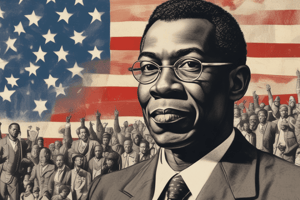Podcast
Questions and Answers
What is war profiteering?
What is war profiteering?
Making excessive profits from war and military conflict.
How does high defense spending impact domestic needs?
How does high defense spending impact domestic needs?
It prevents allocation of funds towards needs like education, healthcare, and infrastructure.
What are the negative consequences of militarization on society?
What are the negative consequences of militarization on society?
Increased polarization and social divisions.
What is the concern regarding the shift of funds from global aid to defense spending?
What is the concern regarding the shift of funds from global aid to defense spending?
Why is the influence of the military-industrial complex on public policy concerning?
Why is the influence of the military-industrial complex on public policy concerning?
Study Notes
The US Permanent War Economy
The concept of the US permanent war economy refers to an economic model characterized by high levels of military spending and a persistent state of conflict. This phenomenon can be traced back to World War II, when the United States shifted towards a wartime footing that involved extensive military production and mobilization of resources. Since then, military spending has remained consistently high, even during periods of peace, and has been seen as a tool to maintain stability and keep political uprisings at bay. The term "permanent war economy" was coined by the economist Walter Oakes, who predicted that late capitalism would naturally develop such an economy.
Subtopics
Military-Industrial Complex
The US military industrial complex is a network of companies that produce military equipment, weapons systems, and technology. It is closely tied to high levels of defense spending, which creates demand for goods and services produced by these businesses. Critics argue that the military industrial complex exerts undue influence over public policy and the government due to its close ties with the Department of Defense.
Impact on Society
The permanent war economy has significant implications for US society. High levels of military spending divert resources away from social programs, education, infrastructure development, and environmental protection. Additionally, the militarization of society can lead to negative consequences such as increased polarization and social divisions.
Defense Spending
Defense spending is a major component of the US federal budget. In fiscal year 2020, defense spending accounted for approximately 34% of total federal government expenditures. This figure has remained relatively stable over the past decade, despite calls for reduction in defense spending. Critics argue that these high levels of spending could be better allocated towards domestic needs such as education, healthcare, and infrastructure.
War Profiteering
War profiteering refers to the practice of making excessive profits from war and military conflict. The permanent war economy provides opportunities for companies to profit from ongoing conflicts and militarization efforts. However, this can lead to unchecked corporate influence over public policy and a lack of accountability.
Global Aid
In recent years, the US government has been criticized for diverting funds originally intended for foreign aid towards defense spending. This shift in priorities has led to concerns about the effectiveness of global aid programs and their impact on reducing poverty and improving living conditions around the world.
Conclusion
The US permanent war economy has become an entrenched aspect of American society, with significant implications for both domestic and international issues. High levels of military spending have played a role in maintaining political stability but have also had negative consequences such as resource diversion, social polarization, and war profiteering. As the United States continues to grapple with these challenges, it is essential to consider alternative approaches to defense spending and the role of the military industrial complex in shaping public policy.
Studying That Suits You
Use AI to generate personalized quizzes and flashcards to suit your learning preferences.
Description
Explore the concept of the US permanent war economy, characterized by high military spending and a constant state of conflict. Learn about the military-industrial complex, impact on society, defense spending, war profiteering, and global aid. Understand the influence of this economic model on American society and international relations.




